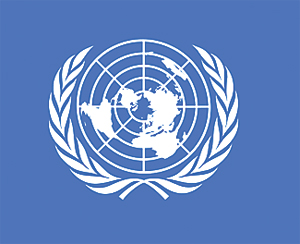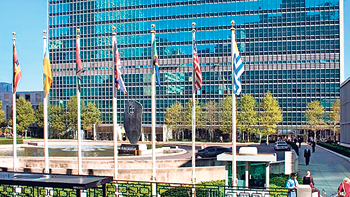December 14, 1955 was a red letter day for
Sri Lanka (then Ceylon) – the day that the country was admitted as a member of the United Nations Organisation (UNO now referred to as UN). That was seven years after Sri Lanka gained independence.
Although several attempts had been made to gain admission to the UN, the Soviet Union – one of the big powers then – blocked our entry. New members had to be ratified by the Security Council and the Soviet Union being one of the five permanent
members of the Security Council, it had the power of veto. (The other four
members were United States of America, Britain, France and China).
Soviet Union vetoed our admission on the ground that Sri Lanka still had a defence agreement with the United Kingdom (because of the naval base in Trincomalee and the air base at Katunayaka belonging to the British).
It maintained that Ceylon was thus not a truly
independent state but still a British colony. Moreover, Sri Lanka was caught up in the cold war conflict between the Soviet Union and the United States thus becoming a
victim. In retaliation, the Western powers kept
vetoing Soviet allies barring them from UN membership.
Although we were
knocking at the UN door for five years, it was only after a package deal was agreed upon that we gained
admission in December 1955. US agreed to hold back its veto on Soviet allies such as Albania, Bulgaria, Hungary and Romania. Thus 16 new member
countries including
Sri Lanka were admitted to the UN on the same day. With the new members, the UN membership increased to 76. (In 1945, the membership was 51 and by 2006, it had risen to 192).
When Sri Lanka got admitted to the UN,
Sir John Kotelawela was the Prime Minister. Two months after gaining admission,
Sir John dissolved Parliament hoping that it would be an advantage, among other reasons to go for a general election. However, it proved to be a costly mistake on his part with the ruling UNP party being reduced to just eight seats in the new Parliament.
A senior politician who had served the first
D. S. Senanayake Cabinet, R. S. S. (later Sir Senerat) Gunawardena was
appointed as the country's first Permanent Representative (Ambassador) in the UN in addition to being Sri Lanka's Ambassador in the US. On December 15, 1955 he took his seat in the country desk at the General Assembly
sessions. The ceremonial hoisting of the lion flag at the UN headquarters in New York took place a few months later, on March 9, 1956 – the day flags of the 16 new member nations were raised in the presence of the UN Secretary-General, Dag Hammarskjold.(A Swedish national, Hammarskjold died in a mysterious plane crash in the Congo in 1961).
Renowned scholar
Dr. Gunapala Malalasekera, after serving as Sri Lanka's first Ambassador in the Soviet Union and later as UK High Commissioner, was appointed Permanent Representative in the UN. Another distinguished
personality to serve in the capacity in the early years was Sir Claude Corea, one time Minister of Trade & Commerce and High Commissioner in UK.
Sri Lanka's UN Representatives and senior civil servants have made a mark in the UN being appointed to responsible positions of UN Agencies. Hamilton Shirley Amerasinghe was not only elected President of the General Assembly, the
highest policy making body at the United Nations, in September 1976, but also chaired the historic Law of the Sea Conference which produced the ultimate treaty governing the ocean sea-bed.
Twice, once in 1982 and again in 1999, Nandasiri Jasentuliyana, an
international expert on space law, was named Executive Secretary of the second and third UN Conferences on the Exploration and Peaceful Uses of Outer Space
(UNISPACE II & III) that laid down the laws
governing the heavenly skies preventing a possible arms race and a futuristic star wars.
Dr. Gamani Corea's two-term (1974-84) appointment as Secretary-General of the Geneva-based UN Conference on Trade and Development (UNCTAD); Andrew Joseph's stint as Associate Administrator of the UN Development Programme (UNDP) in 1989; Christopher Weeramantry's election as judge of the International Court of Justice (ICJ) in the Hague in 1991; and Jayantha Dhanapala's appointment as
Under-Secretary-General for Disarmament Affairs in 1998 were notable achievements of Sri Lankans.
More recently, in 2006, Dr. Radhika Coomaraswamy was appointed Under-Secretary-General (USG) for Children in Armed Conflict.
Another noteworthy event is the fact that the three Bandaranaikes – father (SWRD), mother (Sirimavo) and daughter (Chandrika Kumaratunga) – addressed the UN, the first two as Prime Minister and the third as President. The parallel is India's Nehru family – Jawaharlal Nehru, his daughter Indira Gandhi, and her son Rajiv.
Over half a century,
Sri Lanka had gained
considerable assistance from UN sponsored
projects which would be the subject of another column later. |


